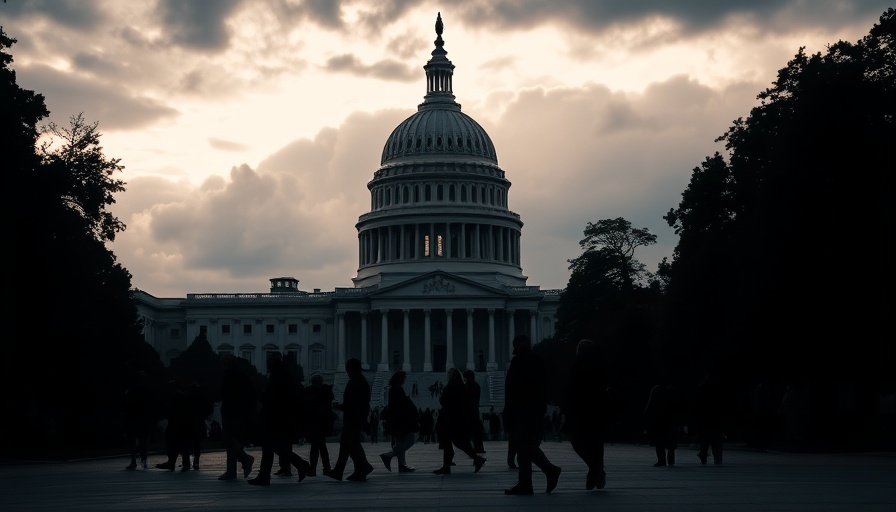
The Implications of Moody’s Credit Rating Downgrade
In a striking move, Moody’s recently downgraded the United States' credit rating below the coveted triple-A level. This marks a critical juncture for the nation's financial landscape, as it reflects broader issues about governance, fiscal responsibility, and the future of American economic policy. With this decision, all three leading credit rating agencies no longer assign the highest ratings to the U.S. government, further amplifying concerns over rising public debt.
A Historical Context of U.S. Credit Ratings
The significance of this downgrade cannot be overstated; it is a cumulative result of years of political gridlock and fiscal irresponsibility. Moody's decision aligns with similar actions taken by both Fitch and Standard & Poor's in recent years. Fitch downgraded the U.S. as early as 2023 due to rising fiscal pressures, while Standard & Poor's did so back in 2011, highlighting long-standing concerns about the sustainability of U.S. debt levels. These downgrades represent a shift in trust among investors, as they perceive increasing risks associated with U.S. fiscal policy.
Washington's Political Climate: Contributing Factors
The current downgrade comes against a backdrop of intense political maneuvering in Washington. President Trump's recent push for a new package of tax cuts—widely criticized for potentially exacerbating the nation’s already dire fiscal situation—has sparked further debate about the sustainability of the U.S. economy. With federal debt exceeding $36 trillion, voters and policymakers alike are left questioning the government's commitment to addressing systemic financial challenges, particularly the underfunding of crucial programs such as Social Security and Medicare.
Potential Economic Ramifications of the Downgrade
The economic implications of this downgrade could manifest swiftly in financial markets. Greater uncertainty may compel investors to demand higher yields on U.S. treasury securities, ultimately raising borrowing costs for consumers and businesses alike. Such a shift could lead to reduced liquidity in the market, potentially affecting growth projections for both the short and long term. While past downgrades have often proven to be largely symbolic, this instance might trigger a more pronounced reaction based on the current economic environment.
Understanding the Long-term Financial Challenges
Moody’s highlighted long-term expenses as a central issue contributing to the downgrade. Programs such as Medicare and Social Security, essential to millions of Americans, are not only underfunded but also increasingly costly. Their rising expenses threaten to destabilize the financial footing that both the government and the economy rely on. Addressing these underlying issues is paramount but has historically been an unpopular or politically risky option for lawmakers.
Public Perception and Trust in Government
This downgrade serves as a wider signal regarding the trust that the international community and American citizens hold toward government fiscal management. It raises questions about the accountability of elected officials in handling debt and budgetary constraints. The perception of an ineffectual government not only undermines public confidence but can also deter foreign investors from committing capital to U.S. markets.
Future Predictions: What Comes Next?
Analysts are left speculating about the future of the U.S. economy following this significant downgrade. Some argue it could push policymakers to finally confront the national debt crisis. Others warn that continued partisanship and legislative gridlock may stall necessary reforms, leaving economic recovery on shaky ground. The impact of this decision may also incite more profound discussions regarding tax policy, spending, and collaborative governance in Washington.
Your Role as Informed Citizens
As members of the public, understanding these economic trends is crucial. Engaging in dialogues about fiscal policy and holding elected officials accountable has never been more important. Citizens should advocate for transparent discussions and support initiatives that aim to address the root causes of rising debt. Ultimately, it’s the informed electorate that guides responsible policymaking.
The downgrade of the U.S. credit rating by Moody’s serves as a clarion call for both citizens and lawmakers. By seizing the opportunity for dialogue and understanding how these economic changes affect daily lives, individuals can play a role in advocating for a more stable future. This does not simply fall on elected officials but requires collective effort from society as a whole. Let us engage in these important discussions and push for fiscal responsibility to ensure a stable economic environment.
 Add Row
Add Row 
 Add
Add 


 Add Row
Add Row 
 Add
Add
Write A Comment